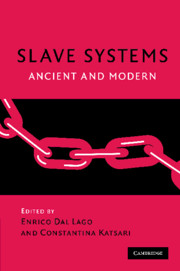Book contents
- Frontmatter
- Contents
- List of figures
- List of tables
- List of contributors
- Acknowledgments
- Part I SLAVERY, SLAVE SYSTEMS, WORLD HISTORY, AND COMPARATIVE HISTORY
- Chapter 1 The study of ancient and modern slave systems: setting an agenda for comparison
- Chapter 2 Slavery, gender, and work in the pre-modern world and early Greece: a cross-cultural analysis
- Chapter 3 Slaving as historical process: examples from the ancient Mediterranean and the modern Atlantic
- Part II ECONOMICS AND TECHNOLOGY OF ANCIENT AND MODERN SLAVE SYSTEMS
- Part III IDEOLOGIES AND PRACTICES OF MANAGEMENT IN ANCIENT AND MODERN SLAVERY
- Part IV EXITING SLAVE SYSTEMS
- Part V SLAVERY AND UNFREE LABOUR, ANCIENT AND MODERN
- Bibliography
- Index
Chapter 3 - Slaving as historical process: examples from the ancient Mediterranean and the modern Atlantic
from Part I - SLAVERY, SLAVE SYSTEMS, WORLD HISTORY, AND COMPARATIVE HISTORY
Published online by Cambridge University Press: 22 September 2009
- Frontmatter
- Contents
- List of figures
- List of tables
- List of contributors
- Acknowledgments
- Part I SLAVERY, SLAVE SYSTEMS, WORLD HISTORY, AND COMPARATIVE HISTORY
- Chapter 1 The study of ancient and modern slave systems: setting an agenda for comparison
- Chapter 2 Slavery, gender, and work in the pre-modern world and early Greece: a cross-cultural analysis
- Chapter 3 Slaving as historical process: examples from the ancient Mediterranean and the modern Atlantic
- Part II ECONOMICS AND TECHNOLOGY OF ANCIENT AND MODERN SLAVE SYSTEMS
- Part III IDEOLOGIES AND PRACTICES OF MANAGEMENT IN ANCIENT AND MODERN SLAVERY
- Part IV EXITING SLAVE SYSTEMS
- Part V SLAVERY AND UNFREE LABOUR, ANCIENT AND MODERN
- Bibliography
- Index
Summary
This chapter explores dynamic aspects of the book editors' challenge to consider the rise and demise of ‘slave systems’ in the ancient Mediterranean and in the emergently modern Atlantic – but it offers a historical approach to recurrent slaving as incremental processes of change in place of the structural premise of abstract and implicitly static ‘slave systems’ that underlies the method of comparison implicitly proposed, and also nearly all the current literature on slavery. Slavers marginal to particular historical contexts in which they lived, earlier and later, found both means and motivation to advance themselves, at the expense of rivals in control of, but limited to, local resources by acquiring outsiders whom they exclusively controlled. This recurrent historical dialectic, uniquely contextualized in both ancient times and the modern Atlantic, as well as elsewhere in the world, identifies similarities and differences in the historical dynamics that explain the resulting parallels and contrasts that conventional comparisons in structural terms describe.
Slaving is fundamentally a historical process, as slaving strategies achieved prominence primarily in times and places where rapid military or economic expansion facilitated access to outsiders. It was also, thus, generally a by-product, a secondary strategy, arising from specifiable tensions within larger and more complex historical processes. Significant slaving and integration of the slaves in turn contributed to still others.
Information
- Type
- Chapter
- Information
- Slave SystemsAncient and Modern, pp. 70 - 102Publisher: Cambridge University PressPrint publication year: 2008
Accessibility standard: Unknown
Why this information is here
This section outlines the accessibility features of this content - including support for screen readers, full keyboard navigation and high-contrast display options. This may not be relevant for you.Accessibility Information
- 12
- Cited by
